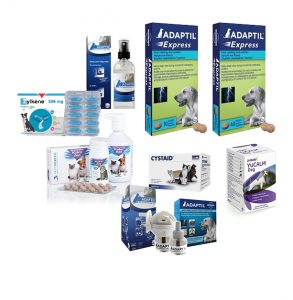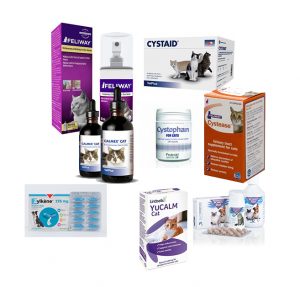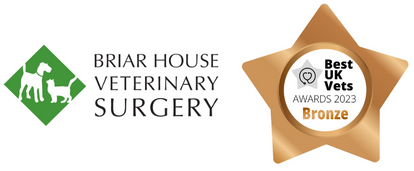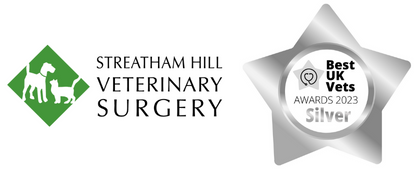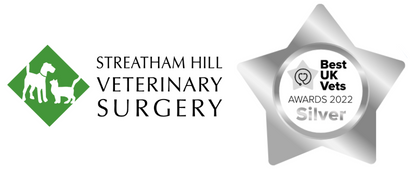
For the last three months, pets have been enjoying the constant companionship during the day and getting that extra attention. Especially our canine friends, who are pack animals, might be overjoyed at the amount of time we’re spending with them. While many of us have welcomed new members in the family during the lockdown, these puppies grew up being used to having us around 24/7. Cats may seem that they have easy and relaxed lives, but the truth is, they are very sensitive to change and possibly they have been stressed since the beginning of this crisis.
The COVID-19 pandemic and the multi-layered pressures of lockdown have caused many of us to experience higher levels of anxiety than usual which manifests with less sleep and also increased tensions from being cooped up. Luckily, for those of us with pets we have been able to turn to our faithful companions for their unwavering emotional support and comfort.
The easing of the lockdown and us returning to a ‘new’ normal, are likely to cause stress to these pets who have now become accustomed to the lockdown existence. So what can we do to help reduce the anxiety for our pets? Well, it’s time to begin preparing your pets for life after lockdown and ease them back into their normal routines.
Stress in Dogs
With just an overload of quality time with their families, our loyal pooches are likely to develop separation anxiety which can manifest as:
- Howling, barking or whining
- Destruction of property such as scratching walls and doors and chewing furniture
- Going to the toilet indoors
- Aggression
To help ease your dog back into normality, here are a few measures you can take:
Stick to your routine
Please try to stick to your normal daily routine as much as possible. Feed them at the same time each day. Try having set times for training and play when you might previously have gone out for walks.
Plan ahead
Now that most pet services are opening again, it is a great time to get everything ready and organised. You might want to consider gradually introducing the dog walker and the odd day at doggie day care. Ensure your vaccines (including kennel cough) and flea and worming treatments are up to date as you might need them for getting your dog back to more social times. In addition, bear in mind that most dogs will need a spot on grooming and many groomers may have waiting lists, so book your appointment as early as possible.

Being apart from them
Get your dog ready for post lockdown now, by leaving the room for a while and get them used to you not being around. Build up the time you are away each time and always return with a treat. Pop out to the shops for short periods of time without them so they get used to spending time alone. Getting them used to this routine will help to reduce stress when you have to eventually leave your home. If you are away for long periods during the day, consider using a WIFI camera to see what your dog is up to.
Exercise
Make sure they get enough time outside before you leave the house to ensure they have been to the toilet and had sufficient exercise. If you take them for a walk in the morning, this may wear them out for the few hours you are away. However, please be careful not to over-exercise. Especially older and arthritic dogs and Brachycephalic breeds such as Pugs, English Bulldogs, Boxers etc. have low tolerance for vigorous exercise and are highly susceptible to heat exhaustion and heatstroke.
Now that the weather is warming up, it is also important to ensure your pet is up to date with their flea and worming treatment. These pesky visitors can cause many issues to your furry friends but most importantly, they can increase stress and anxiety both to you and your pet.
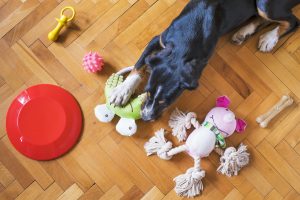
Provide entertainment
Make sure that your dog has enough toys to play with, which would be a great distraction whilst you are away. Food-related toys or chews are a great way to keep their mind occupied during the time you are not at home.
Safe zone
Make sure they have a cosy bed or covered den away from the main thoroughfare of the house and distracting activities. Try not to disturb them whenever they are in their bed. Create a safe zone or den for your pet to retreat to if they are feeling extra anxious. You could leave a jumper or t-shirt with your smell to comfort them when you are not there.
Play some music
Studies have shown that classical music and reggae are the most calming genres for dogs. So prepare a playlist for your pooch or leave the TV and radio on for background noise. If you live on a main road close curtains or blinds to try to block out any noise or distractions from anyone that may walk past.
Teach them to be independent
It’s normal for pets to want to be with us but teaching your dog not to follow you around the house is a good idea because it will help them not to rely on you being present all the time. If they do follow you, don’t speak to them, make eye contact or touch them. Don’t feel mean doing this, you’re just teaching them that following you everywhere is boring! This will help them when you actually have to leave them all alone. It’s important that you don’t tell them off or to “go away” and remember to ignore unwanted behaviour and reward good behaviour.
Don’t punish them
If you leave your dog and return to mess or destruction, don’t punish them as this could lead to them becoming worried about you returning.
Ask a friend of neighbour to check in on them
Once the lockdown has been lifted and you return to work, if it is safe to do so, ask a friend or neighbour to check on your lovely pet. If they are left for long periods during the day, getting someone to check on them will allow them time to go to the toilet if needed and enjoy some interaction during that time.
Puppies
During the corona crisis, we have seen a massive increase in puppies being adopted resulting in a puppy shortage across the UK. In the first year or so, puppies are too young to be left alone for long periods during the day so it might worth looking at doggie daycare or ask friends and family to take care of them whilst you are away. Nevertheless, training and encouraging them to spend some time alone, will help ease the transition to a normality in which you are not around all day.
Calming products
If your pet is very stressed when you are away, you might also want to consider trying some products (plug ins, sprays and collars) that will help your pet relax and stay stress-free. Supplements like Zylkene or Nutricalm help to promote the feeling of relaxation. Or, if your pet isn’t keen on tablets, Adaptil diffusers release pheromones that help your pets feel safe, calm and secure.
Stress in Cats

Cats can often tune into their human’s feelings and since your daily routine has changed due to the lockdown, so has your cat’s. There has been a possible increase in stress-related cystitis, which might be due to a change of routine and diet amongst other factors. Feline urinary problems are closely related to stress, so it is important to know what symptoms to look out for and how to help your feline friends. Straining when urinating, incontinence, reduced appetite and urinating outside of the litter box are some of the signs that could indicate your cat is stressed. Some of the things you can do to help your cat relax are:
Avoid contact with other cats
Cats are getting easily stressed when other cats are invading their personal space so try to stop other cats coming into the house or garden.
Balanced diet
Maintaining a consistent and balanced diet can relieve stress and get them back on the path of feeling relaxed and calm.
Flea and worm treatment
Keeping up to date with your flea and worming treatment is very important for our feline friends as fleas and other pesky parasites can cause higher levels of stress and discomfort both to you and your cat.
Microchip
Microchipping is necessary for cats as the like to explore and venture around, so it is vital to ensure your feline companion is microchipped and the details are up to date.
Make changes to your home
Sometimes, improving your home environment can also calm your cat. Try keeping the litter box and house very clean and make sure they are well hydrated which can relieve stress and reduce or even eliminate urinary problems. Installing a microchip cat flap, in case you haven’t already, is another great idea that will keep out intruders that might stress your cat.
Calming Products
Pheromones such as Feliway plugins or supplements such as Cystease are a few of the products that could keep your cat stress-free. Remember that external influences or changes in your routine have a direct impact on your cat’s state of mind and can affect your cat’s urinary health. Cystaid and Cystophan are products recommended by vets that could be very useful in preventing stress associated with cystitis. As soon as your cat shows signs of urinary stress, it is important to call our surgery so that we can help you. Our vets may advise using medication or adjusting your cat’s diet which could relieve some urinary issues and make them feel calm again.

